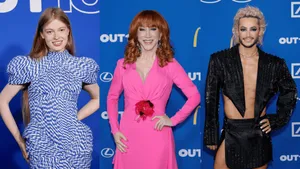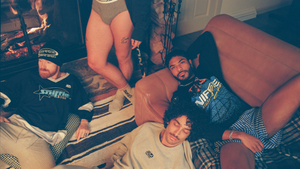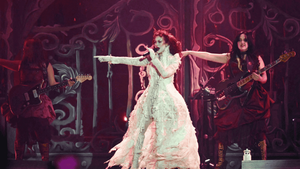Ireland Baldwin kisses "gal pal" Angel Haze. Cara Delevingne puckers up with "gal pal" Michelle Rodriguez. Kristen Stewart and "gal pal" Alicia Cargile show PDA. Miley Cyrus cozies up to "gal pal" Stella Maxwell. Samira Wiley and Lauren Morelli can't be dating -- they're just gal pals!
These are some clickbait headlines from the past year alone. Tabloids and websites hunger for the faintest hint of a romantic or sexual relationship between straight celebrities; meanwhile, overt displays of affection between queer couples -- particularly when no men are involved -- are never presented as serious. The fundamental disparity between how queer relationships and straight relationships are treated in the public space of the Internet is embodied in the absurd phrase "gal pals."
"Gal pals" turns female social relations into something petty and infantilized. The women are called "gals" instead of women. A pal is someone beyond acquaintance, but not quite as serious as friend. The relationship is a silly, superficial friendship that probably involves slumber parties and pillow fights.
Notably, the women involved rarely -- if ever -- self-define the relationship as "gal pals." Outsiders, i.e. the media, prescribe this label, which delegitimizes the relationship, taking its labeling out of the hands of those involved. The phrase ignores and invalidates queer female relationships, refusing to view lesbian or bi relations as legitimate.
The "gal pal" phenomenon stems from a broader issue. Extending prior to and outside of the Internet, queer female relationships are overtly delegitimized. Public displays of affection are often fetishized. Straight men, particularly, engage in catcalling female pairs, drawing attention to their desire for inclusion and possession over what they see: "Why wasn't I invited?" or "You just haven't tried a guy like me yet." The behavior is an attempt to possess a relationship as their own sexual object.
In addition to voyeurism, public displays of queer female affection are prescribed false ulterior motives. There is a common social stigma where expressions of queer sexuality are seen or claimed as a performance for others; their displays are really just a show for the purpose of attracting men.
While it is important not to out someone not formally out, this clearly is not the concern of these headline writers. Rather than refraining from outing, "gal pals" prescribes heteronormativity over the expression of the "gals." There is neither room nor recognition of other identities. It enforces a culture where a heteronormative identity is plastered over the relationship from the outside and denies personal agency of those inside the relationship.
But it's not just about what the media produces. The "gal pal" phenomenon is not an isolated trend; it is an extension of intersecting queerphobia and misogyny already seen in physical public space. The phenomenon of devaluing, infantalizing, and erasing queer women's relationships has always pervaded the world, long before the Internet. Madonna and Sandra Bernhardt made tabloid headlines in the late 1980s where their relationship was framed as wild and silly girlish fun performed for the gaze of the cameras (an image possibly manufactured by them); headlines often included the loaded phrase "gal pals." With the Internet, the "gal pal" phenomenon has merely come into contact with a new medium. Policing, gawking at, and devaluing queer female relationships is far from new, but now it is occupies a broader space and is more easily shared-- with the click of a button.
Many poke fun at these clueless headlines. But we cannot simply view them as an isolated trend. We must recognize that the Internet is inextricably intertwined with and informed by the outside world. We must recognize how this phenomenon arises from a broader culture of intersecting heteronormativity and misogyny that decenters queer women from their own relationships. Ultimately, we cannot just laugh at the symptoms; we must critically address and engage with the whole of the illness.
 REBECCA TEICH is a student at Columbia University studying English. Her writing, both creative and expository, is featured on BigThink and Poetry in Performance, and will be featured in an upcoming issue in Crab Fat Literary Magazine. She currently works as an editor for the Columbia Journal of Literary Criticism, as an assistant instructor for writing workshops, and the head editorial intern for two literary magazines at Writopia Lab, a youth creative writing organization.
REBECCA TEICH is a student at Columbia University studying English. Her writing, both creative and expository, is featured on BigThink and Poetry in Performance, and will be featured in an upcoming issue in Crab Fat Literary Magazine. She currently works as an editor for the Columbia Journal of Literary Criticism, as an assistant instructor for writing workshops, and the head editorial intern for two literary magazines at Writopia Lab, a youth creative writing organization.


 REBECCA TEICH is a student at Columbia University studying English. Her writing, both creative and expository, is featured on BigThink and Poetry in Performance, and will be featured in an upcoming issue in Crab Fat Literary Magazine. She currently works as an editor for the Columbia Journal of Literary Criticism, as an assistant instructor for writing workshops, and the head editorial intern for two literary magazines at Writopia Lab, a youth creative writing organization.
REBECCA TEICH is a student at Columbia University studying English. Her writing, both creative and expository, is featured on BigThink and Poetry in Performance, and will be featured in an upcoming issue in Crab Fat Literary Magazine. She currently works as an editor for the Columbia Journal of Literary Criticism, as an assistant instructor for writing workshops, and the head editorial intern for two literary magazines at Writopia Lab, a youth creative writing organization.

































































Charlie Kirk DID say stoning gay people was the 'perfect law' — and these other heinous quotes